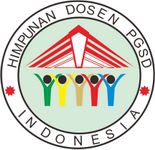Penerapan Model Pembelajaran Group Investigation Berbasis Lingkungan Sekitar pada Mata Pelajaran IPAS di SD Negeri Tulangampiang Denpasar
DOI:
https://doi.org/10.31949/jee.v6i4.6619Abstract
Learning success can be seen through the learning process obtained by students. Choosing the right learning model greatly influences students' learning success. Based on the results of observations, teachers as educators at Tulangampiang State Elementary School still predominantly use conventional learning models. Choosing a group investigation learning model based on the surrounding environment can be used as an alternative to achieve learning success. This research aims to describe the application of the group investigation learning model based on the surrounding environment at Tulangampiang State Elementary School, Denpasar. This type of research is qualitative with a descriptive approach. The research took place for approximately six months in the even semester of the 2022/2023 academic year at Tulangampiang State Elementary School, Denpasar. The research subjects were educators and 41 students in the VA class who were determined using a purposive sampling technique. This research uses human instruments, or researchers as key instruments which are also equipped with interview, observation and documentation techniques. The research procedure follows the flow of qualitative research procedures with data analysis techniques using the Miles and Huberman Model, as well as testing the validity of the data through credibility, transferability, dependability and conformability tests. The research results show that the application of the environment-based group investigation learning model can be described through the implementation of syntax during learning, which consists of; selecting topics, cooperative planning, implementation, analysis and synthesis, presenting final results and evaluation. Even though the observation results vary in percentage, they have shown the phenomenon of teacher and student activity in each syntax. The science learning undertaken by students has been provided in a real and concrete way through a group investigation model based on the surrounding environment so that it is in accordance with the role of teachers in teaching science in elementary schools. The group investigation learning model based on the surrounding environment can be used by teachers to ensure the quality of the learning process is better and meets expectations.
Keywords:
Group Investigation, Lingkungan Sekitar, Mata Pelajaran IPASDownloads
References
Anwar, C. (2017). Buku Terlengkap Teori-Teori Pendidikan Klasik Hingga Kontemporer. Pusat Penerbitan LPPM.
Arends, R. I. (2013). Belajar untuk Mengajar (D. Mandasari (ed.); 9th ed.). Mc Graw Hill Education dan Salemba Humanika.
Astini, G. N. (2023). Model Group Investigation untuk Meningkatkan Hasil Belajar Biologi Siswa Kelas X IPA 1 SMA. Journal of Education Action Research, 7(2), 298–302.
Ekayanti, N. W., & Setiawati, G. A. D. (2018). Interaksi Social Skill dengan Model Group Investigation Berbasis Lingkungan Sekitar Sekolah Terhadap Hasil Belajar. Prosiding Seminar Nasional Pendidikan Biologi, 912–923. https://jurnalfkip.unram.ac.id/index.php/SemnasBIO/article/view/694
Kirom, A. (2017). Peran Guru dan Peserta Didik dalam Proses Pembelajaran Berbasis Multikultural. Al-Murabbi: Jurnal Pendidikan Agama Islam, 3(1), 69–80.
Mulyadinata, I. P. L., Wiyasa, K. N., & Suniasih, N. W. (2020). Peran Model Pembelajaran Group Investigation Berbasis MediaLingkungan Terhadap Kompetensi Pengetahuan IPA. Jurnal EDUTECH Universitas Pendidikan Ganesha. Vol. 8 No. (1) Pp. 102-111, 8(1), 102–111. https://ejournal.undiksha.ac.id/index.php/JEU
Nurhikmah, & Hasanah, E. (2021). Manajemen Pembelajaran Berbasis Lingkungan di Sekolah Dasar 07 Pekat NTB. Jurnal Studi Guru Dan Pembelajaran, 4(2), 272–281. https://doi.org/10.30605/jsgp.4.2.2021.570
Parinduri, S. H., Sirait, M., & Sani, R. A. (2017). The Effect of Cooperative Learning Model Type Group Investigation for Student’s Conceptual Knowledge and Science Process Skills. IOSR Journal of Research & Method in Education, 7(4), 49–54. https://doi.org/10.9790/7388-0704034954
Pratami, A. Z., Suhartono, S., & Salimi, M. (2019). Penerapan model Pembelajaran Group Investigation untuk Meningkatkan Hasil Belajar Ilmu Pengetahuan Sosial. Jurnal Pendidikan IPS, 6(2), 164–174.
Rahayu, T. M., Astutik, S., & Prihandono, T. (2017). Model Pembelajaran Kooperatif Tipe Group Investigation Berbasis Observasi Gejala Fisis Pada Pembelajaran IPA-Fisika di SMP. Jurnal Pembelajaran Fisika, 6(1), 56–62.
Santosa, P. (2018). Mahir Praktikum Biologi, Penggunaan Alat-Alat Sederhana dan Murah Untuk Percobaan Biologi. Deepublish.
Sari, Y., Tanjung, I. F., & Khairuna. (2022). Penerapan Pemanfaatan Lingkungan Sekitar Tempat Tinggal dengan Pembelajaran Group Investigation dalam Meningkatkan Hasil Belajar Biologi Siswa. Jurnal Pendidikan Tambusai, 6(1), 758–763.
Setiawati, G. A. D. (2021). Mengajar IPA Bagi Peserta Didik Muda (Young Learner): Dari Perspektif Weda dan Budaya. Santiaji Pendidikan, 11(2), 127–133.
Sugiyono. (2018). Metode Penelitian Pendidikan (Pendekatan Kuantitatif, Kualitatif, dan R&D). Alfabeta.
Suhartono, S., & Indramawan, A. (2021). Group Investigation (Konsep dan Implementasi dalam Pembelajaran). Academia Publication.
Wibowo, A., Aman Simaremare, & Anita Yus. (2022). Analisis Permasalahan Belajar Pendidikan Dasar. Journal of Social Interactions and Humanities, 1(1), 37–50. https://doi.org/10.55927/jsih.v1i1.454
Yunanto, S. J. (2004). Sumber Belajar Anak Cerdas. Grasindo.











